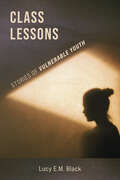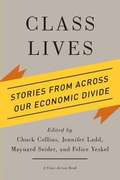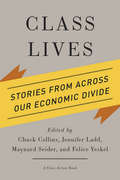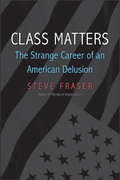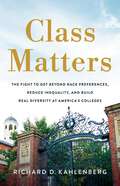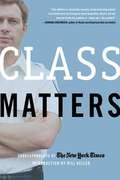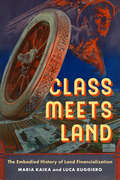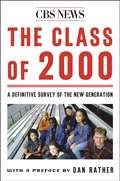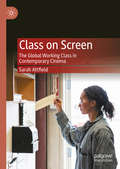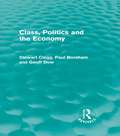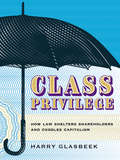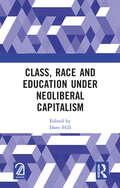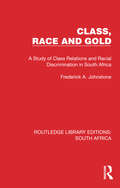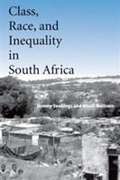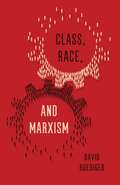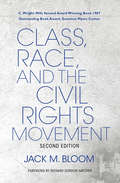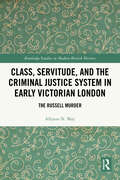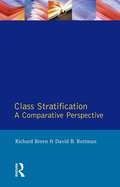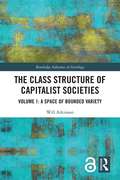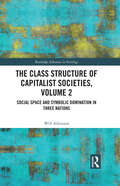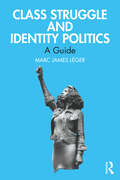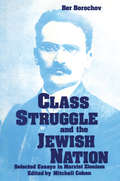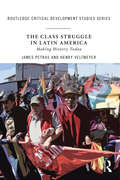- Table View
- List View
Class Lessons: Stories of Vulnerable Youth
by Lucy E. M. BlackToday' s schools are meant to be all things to all people, but can they be? Schools are responsible for socialization, skills development and knowledge acquisition which take place within an institution serving disparate student populations. Unfortunately, school success is not experienced by all students, especially those for whom chaotic home lives are overwhelming. Schools should provide an important safe haven for students, offering advocacy and wraparound care. Fictionalized to protect the identities of those involved, the narratives between these pages shine a spotlight on the vulnerability of youth, and in particular, young people living in heart-breaking circumstances. Upholding the work that takes place in schools and embracing those support systems which are shared between school and community is crucial to enacting lasting and positive change. Drawn from the life experiences of a career educator, this collection seeks to highlight a broad range of needs while also reinforcing the way forward through school-community partnerships.
Class Lives: Stories From Across Our Economic Divide
by Chuck Collins Jennifer Ladd Maynard Seider Felice YeskelClass Lives is an anthology of narratives dramatizing the lived experience of class in America. It includes forty original essays from authors who represent a range of classes, genders, races, ethnicities, ages, and occupations across the United States. Born into poverty, working class, the middle class, and the owning class--and every place in between--the contributors describe their class journeys in narrative form, recounting one or two key stories that illustrate their growing awareness of class and their place, changing or stable, within the class system. The stories in Class Lives are both gripping and moving. One contributor grows up in hunger and as an adult becomes an advocate for the poor and homeless. Another acknowledges the truth that her working-class father's achievements afforded her and the rest of the family access to people with power. A gifted child from a working-class home soon understands that intelligence is a commodity but finds his background incompatible with his aspirations and so attempts to divide his life into separate worlds. Together, these essays form a powerful narrative about the experience of class and the importance of learning about classism, class cultures, and the intersections of class, race, and gender. Class Lives will be a helpful resource for students, teachers, sociologists, diversity trainers, activists, and a general audience. It will leave readers with an appreciation of the poignancy and power of class and the journeys that Americans grapple with on a daily basis.
Class Lives: Stories from across Our Economic Divide
by Chuck Collins Felice Yeskel Jennifer Ladd Maynard SeiderClass Lives is an anthology of narratives dramatizing the lived experience of class in America. It includes forty original essays from authors who represent a range of classes, genders, races, ethnicities, ages, and occupations across the United States. Born into poverty, working class, the middle class, and the owning class--and every place in between--the contributors describe their class journeys in narrative form, recounting one or two key stories that illustrate their growing awareness of class and their place, changing or stable, within the class system. The stories in Class Lives are both gripping and moving. One contributor grows up in hunger and as an adult becomes an advocate for the poor and homeless. Another acknowledges the truth that her working-class father's achievements afforded her and the rest of the family access to people with power. A gifted child from a working-class home soon understands that intelligence is a commodity but finds his background incompatible with his aspirations and so attempts to divide his life into separate worlds. Together, these essays form a powerful narrative about the experience of class and the importance of learning about classism, class cultures, and the intersections of class, race, and gender. Class Lives will be a helpful resource for students, teachers, sociologists, diversity trainers, activists, and a general audience. It will leave readers with an appreciation of the poignancy and power of class and the journeys that Americans grapple with on a daily basis.
The Class Matrix: Social Theory after the Cultural Turn
by Vivek ChibberAn influential sociologist revives materialist explanations of class, while accommodating the best of rival cultural theory. Following the collapse of the Soviet Union, analysis of class and other basic structures of capitalism was sidelined by theorists who argued that social and economic life is reducible to culture—that our choices reflect interpretations of the world around us rather than the limitations imposed by basic material facts. Today, capitalism is back on the agenda, as gross inequalities in wealth and power have pushed scholars to reopen materialist lines of inquiry. But it would be a mistake to pretend that the cultural turn never happened. Vivek Chibber instead engages cultural theory seriously, proposing a fusion of materialism and the most useful insights of its rival. Chibber shows that it is possible to accommodate the main arguments from the cultural turn within a robust materialist framework: one can agree that the making of meaning plays an important role in social agency, while still recognizing the fundamental power of class structure and class formation. Chibber vindicates classical materialism by demonstrating that it in fact accounts for phenomena cultural theorists thought it was powerless to explain. But he also shows that aspects of class are indeed centrally affected by cultural factors. The Class Matrix does not seek to displace culture from the analysis of modern capitalism. Rather, in prose of exemplary clarity, Chibber gives culture its due alongside what Marx called “the dull compulsion of economic relations.”
Class Matters: The Strange Career of an American Delusion
by Steve FraserA uniquely personal yet deeply informed exploration of the hidden history of class in American life From the decks of the Mayflower straight through to Donald Trump’s “American carnage,” class has always played a role in American life. In this remarkable work, Steve Fraser twines our nation’s past with his own family’s history, deftly illustrating how class matters precisely because Americans work so hard to pretend it doesn’t. He examines six signposts of American history—the settlements at Plymouth and Jamestown; the ratification of the Constitution; the Statue of Liberty; the cowboy; the “kitchen debate” between Richard Nixon and Nikita Khrushchev; and Martin Luther King’s “I Have a Dream” speech—to explore just how pervasively class has shaped our national conversation. With a historian’s intellectual command and a riveting narrative voice, Fraser interweaves these examples with his own past—including his false arrest on charges of planning to blow up the Liberty Bell during the Civil Rights era—to tell a story both urgent and timeless.
Class Matters: The Fight to Get Beyond Race Preferences, Reduce Inequality, and Build Real Diversity at America's Colleges
by Richard D KahlenbergA powerful argument for a class-based approach to college admissions that &“shows where we have gone wrong so far, and how we will get to justice, equality, and even diversity for real&” (John McWhorter) For decades America&’s colleges and universities have been working to increase racial diversity. But they have been using the wrong approach, as Richard Kahlenberg persuasively shows in his highly personal and deeply researched book. Kahlenberg makes the definitive case that class disadvantage, rather than race, should be the determining factor for how a broader array of people &“get in.&” While elite universities claim to be on the side of social justice, the dirty secret of higher education is that the perennial focus on racial diversity has provided cover for an admissions system that mostly benefits the wealthy and shuts out talented working-class students. By fixing the class bias in college admissions we can begin to rectify America&’s skyrocketing economic inequality and class antagonism, giving more people a better place at the table as they move through life and more opportunity to &“swim in the river of power.&” Kahlenberg has long worked with prominent civil rights leaders on housing and school integration. But his recognition of class inequality in American higher education led to his making a controversial decision to go over to the &“other side&” and provide research and testimony in cases that helped lead to the controversial Supreme Court decision of 2023 that ended racial preferences. That conservative ruling could, Kahlenberg shows, paradoxically have a progressive policy outcome by cutting a new path for economic and racial diversity alike – and greater fairness.
Class Matters
by Bill KellerThe acclaimed New York Times series on social class in America and its implications for the way we live our lives. "We Americans have long thought of ourselves as unburdened by class distinctions. We have no hereditary aristocracy or landed gentry, and even the poorest among us feel that they can become rich through education, hard work, or sheer gumption. And yet social class remains a powerful force in American life. In Class Matters, a team of New York Times reporters explores the ways in which class--defined as a combination of income, education, wealth, and occupation--influences destiny in a society that likes to think of itself as a land of opportunity. We meet individuals in Kentucky and Chicago who have used education to lift themselves out of poverty and others in Virginia and Washington whose lack of education holds them back. We meet an upper-middle-class family in Georgia who moves to a different town every few years, and the newly rich in Nantucket whose mega-mansions have driven out the longstanding residents. And we see how class disparities manifest themselves at the doctor's office and at the marriage altar. For anyone concerned about the future of the American dream, Class Matters is truly essential reading. Class Matters is a beautifully reported, deeply disturbing portrait of a society bent out of shape by harsh inequalities. Read it and see how you fit into the problem or--better yet--the solution!'-Barbara Ehrenreich, author of Nickel and Dimed and Bait and Switch
Class Meets Land: The Embodied History of Land Financialization (IJURR Studies in Urban and Social Change)
by Dr. Maria Kaika Luca RuggieroClass Meets Land reveals something seemingly counterintuitive: that nineteenth-century class struggles over land are deeply implicated in the transition to twenty-first-century financial capitalism. Challenging our understanding of land financialization as a recent phenomenon propelled by high finance, Maria Kaika and Luca Ruggiero foreground 150 years of class struggle over land as a catalyst for assembling the global financial constellation. Narrating the close-knit histories of industrial land, industrial elites, and the working class, the authors offer a novel understanding of land financialization as a "lived" process: the outcome of a relentless, socially embodied historical unfolding, in which shifts in land’s material, economic, and symbolic roles impact both local everyday lives and global capital flows.
The Class Of 2000
by Dan Rather Cbs NewsIn 1996, in big cities and small towns across America, a new crop of teenagers entered the ninth grade. These students, the class of 2000, experienced the world in a unique way, often enjoying the benefits of a booming economy but also living through a wave of school violence, a presidential sex scandal and impeachment, the dawn of a new century, and the rise of the Internet. Since their first day of high school, the class of 2000 has been interviewed by CBS News in an unprecedented, in-depth study. CBS News's goal was to present a compelling portrait of our country's problems and promise as seen through the eyes of these students. To reach this end, the CBS News Polling Unit conducted scientific polls, revealing the thoughts, fears, and expectations of the class of 2000. The exclusive results of this study are rendered in the e-book The Class of 2000: A Definitive Survey of the New Generation. It paints an unusally clear picture of how these teenagers, now on the brink of adulthood, see the world and their place in it. The Class of 2000 is broken down into important topics such as lying and cheating, religion, dating and sexuality, drugs, guns and violence, school quality, and race relations. Each topic includes profiles and photos of some of the young people interviewed as well as the full polling results and an analysis.
Class on Screen: The Global Working Class in Contemporary Cinema
by Sarah AttfieldThis book provides an analysis of the global working class on film and considers the ways in which working-class experience is represented in film around the world. The book argues that representation is important because it shapes the way people understand working-class experience and can either reinforce or challenge stereotypical depictions. Film can shape and shift discussions of class, and this book provides an interdisciplinary study of the ways in which working-class experience is portrayed through this medium. It analyses the impact of contemporary films such as Sorry To Bother You, This is England and Le Harve that focus on working class life. Attfield demonstrates that the global working class are characterised by diversity of race, ethnicity, gender, religion and sexuality but that there are commonalities of experience despite geographical distance and cultural difference. The book is structured around themes such as work, culture, diasporas, gender and sexuality, and race.
Class, Politics and the Economy (Routledge Revivals)
by Stewart Clegg Paul Boreham Geoff DowThis study, first published in 1986, provides a systematic account of the processes and structure of class formation in the major advanced capitalist societies. The focus is on the organizational mechanisms of class cohesion and division, theoretically deriving from a neo-Marxian perspective. Chapters consider the organization and structure of the ‘corporate ruling class’, the middle class and the working class, and are brought together in an overarching analysis of the organization of class in relation to the state and the economy. This title will be of particular interest to students researching the impact of recession on societal structure and the processes of political class struggle, as well as those with a more general interest in the socio-economic theories of Marx, Engels and Weber.
Class Privilege: How Law Shelters Shareholders and Coddles Capitalism
by Harry GlasbeekCapitalism’s agenda is the endless pursuit of private accumulation of socially produced wealth. In our system, the corporation—created by law—is meant to hide this agenda, to distract us so that flesh and blood capitalists can do what they like. But when the workings of the corporation are examined, they reveal a betrayal of the very values and norms that, for their legitimacy’s sake, capitalists in our parts of the world purport to share. Harry Glasbeek highlights one of capitalism’s weak spots–the perverting economic, political, and ethical roles played by the prime instrument of private wealth accumulation: the legal corporation. Once the corporate mask is ripped off, those who hide behind it become visible. Stripped of their protective garb, the capitalist class will be just as naked as the rest of us are when we face their corporations.
Class, Race and Education under Neoliberal Capitalism
by Dave HillWith the onset of Austerity Capitalism and Immiseration Capitalism, and with the increasing commodification, marketisation and privatisation of society and of education, Marxist Theory and Marxist Education Theory have taken on a new urgency.In this collection of essays, written from a classic Marxist perspective, Dave Hill lays bare how the capitalist class in the knowledge industry/academia, use ideological (and repressive) state apparatuses, such as education, to divide, disarm and demoralise critical, Marxist analysis and activism.This title is co-published with Aakar Books. Print edition not for sale in South Asia (India, Sri Lanka, Nepal, Bangladesh, Pakistan and Bhutan)
Class, Race and Gold: A Study of Class Relations and Racial Discrimination in South Africa (Routledge Library Editions: South Africa #10)
by Frederick A JohnstoneOriginally published in 1976, this book is a sociological and historical study of class and race relations in a crucial sector of South Africa – the gold mining industry, during and following the First World War. The author develops a Marxist structuralist explanation of the system of racial discrimination, and then goes in to examine the significant historical events of this formative period, notably those surrounding the strike and uprising of the white workers in 1922. The book explains a system of racial domination essentially in terms of the class positions and problems of the dominating groups, and examines historical developments concerning race in terms of class.
Class, Race, and Inequality in South Africa
by Jeremy Seekings Nicoli NattrassThe distribution of incomes in South Africa in 2004, ten years after the transition to democracy, was probably more unequal than it had been under apartheid. In this book, Jeremy Seekings and Nicoli Nattrass explain why this is so, offering a detailed and comprehensive analysis of inequality in South Africa from the midtwentieth century to the early twenty-first century. They show that the basis of inequality shifted in the last decades of the twentieth century from race to class. Formal deracialization of public policy did not reduce the actual disadvantages experienced by the poor nor the advantages of the rich. The fundamental continuity in patterns of advantage and disadvantage resulted from underlying continuities in public policy, or what Seekings and Nattrass call the "distributional regime. " The post-apartheid distributional regime continues to divide South Africans into insiders and outsiders. The insiders, now increasingly multiracial, enjoy good access to well-paid, skilled jobs; the outsiders lack skills and employment.
Class, Race and Marxism
by David RoedigerFounder of whiteness studies surveys the race/class relationshipSeen as a key figure in the critical study of whiteness, US historian David Roediger has sometimes received criticism, and praise, alleging that he left Marxism behind in order to work on questions of identity. This volume collects his recent and new work implicitly and explicitly challenging such a view. In his historical studies of the intersections of race, settler colonialism, and slavery, in his major essay (with Elizabeth Esch) on race and the management of labour, in his detailing of the origins of critical studies of whiteness within Marxism, and in his reflections on the history of solidarity, Roediger argues that racial division is not only part of the history of capitalism but also of the logic of capital.
Class, Race, and the Civil Rights Movement (Blacks in the Diaspora)
by Jack M. BloomRevised and updated: the award-winning historical analysis of the civil rights movement examining the interplay of race and class in the American South. In Race, Class, and the Civil Rights Movement, sociologist Jack M. Bloom explains what the civil rights movement was about, why it was successful, and why it fell short of some of its objectives. With a unique sociohistorical analysis, he argues that Southern racist practices were established by the agrarian upper class, and that only when this class system was undermined did the civil rights movement became possible. He also demonstrates how the movement was the culmination of political struggles beginning in the Reconstruction era and influenced by the New Deal policies of the 1930s. Widely praise when it was first published 1987, Race, Class, and the Civil Rights Movement was a C. Wright Mills Second Award–winning book and also won the Gustavus Myers Center Outstanding Book Award. In this second edition, Bloom updates his study in light of current scholarship on civil rights history. He also presents an analysis of the New Right within the Republican Party, starting in the 1960s, as a reaction to the civil rights movement.
Class, Servitude, and the Criminal Justice System in Early Victorian London: The Russell Murder (Routledge Studies in Modern British History)
by Allyson N. MayThis volume draws on the recently discovered and extraordinarily rich scrapbook compiled by prosecuting solicitor Francis Hobler about the 1840 murder of Lord William Russell to consider public engagement with the issues raised from discovery of the murder itself through the ensuing legal processes.The murder of Russell by his valet François Benjamin Courvoisier was a cause célèbre in its own day by virtue of the fact that the victim was a member of one of England’s most prominent political families. For criminal justice historians, the significance of this case lies instead in its timing. In 1840, England had neither an official detective force to investigate the murder nor a public prosecutor to undertake the prosecution. Those accused of felony had only recently (1836) won the right to full legal representation, and the conduct of Courvoisier’s defence was controversial. Reaction to Courvoisier’s execution was also noteworthy, testifying to a new public unease with capital punishment. The subject of master and servant relations in early Victorian England is another key component of the book: previous studies have not considered the murderer’s motivation.This book will be of interest to students and scholars of criminal justice and law, Victorian England, and microhistory.
Class Stratification: Comparative Perspectives
by Richard Breen David B. RottmanAn introductory account of the concept of class stratification, of contemporary approaches to the study of class, and of current debates about its role in the study of society. Definitions and an analysis of different theoretical approaches to class are accompanied by empirical material which compares the class structures of a range of countries and examines social mobility in cross-national perspective.
The Class Structure of Capitalist Societies: Volume 1: A Space of Bounded Variety (Routledge Advances in Sociology)
by Will AtkinsonThis first volume of The Class Structure of Capitalist Societies offers a bold and wide-ranging assessment of the shape and effects of class systems across a diverse range of capitalist nations. Plumbing a trove of data and deploying cutting-edge techniques, it carefully maps the distribution of the key sources of power and documents the major convergences and divergences between market societies old and new. Establishing that the multidimensional vision of class proposed decades ago by Pierre Bourdieu appears to hold good throughout Europe, parts of the wider Western world and Eastern Asia, the book goes on to examine a number of significant themes: the relationship between class and occupation; the intersection of class with gender, religion, geography and age; the correspondences between social position and political attitudes; self-positioning in the class structure; and the extent of belief in meritocracy. For all the striking cross-national commonalities, however, the book unearths consistent variations seemingly linked to distinct politico-economic regimes. This title will appeal to scholars and advanced undergraduate and postgraduate students interested in sociology, politics and demography, and is essential reading for all those interested in social class across the globe.
The Class Structure of Capitalist Societies, Volume 2: Social Space and Symbolic Domination in Three Nations (Routledge Advances in Sociology)
by Will AtkinsonThe second volume of The Class Structure of Capitalist Societies maps the distribution of social powers and associated properties and lifestyles in unparalleled detail by examining the results of a brand-new survey delivered in Sweden, Germany and the US. Continuing the cross-national investigation of the shape and effects of class systems across capitalist nations, the analyses in Volume 2 are embedded in a novel sociological theory of international relations, sustained reflections on the relationship between national standing and class structure and extensive reconstruction of the histories of class in each of the three nations studied. The ultimate conclusion, however, is that not only that the fundamental structure of class today the same across the three cases, for all their unique cultural and historical features, but their translation into differences of taste, practice and symbolic violence, always cross-cut by gender, follow highly familiar patterns too. This volume will appeal to scholars and advanced undergraduate and postgraduate students interested in sociology, politics and demography and is essential reading for all those interested in social class across the globe.
Class Struggle and Identity Politics: A Guide
by Marc James LégerContemporary bipartisan politics undermines socialist solidarity by ignoring class issues and pitting advocates of social justice against ethno-national chauvinists. This guide to the recent wave of "woke" culture wars provides a radical class analysis and critique of the most popular academic trends around diversity and inclusion: radical democracy, intersectionality, privilege theory, critical race theory and decoloniality. The book further explains the complexity of today’s cultural conflicts by examining how these issues are viewed across the political spectrum, including populist and postmodern perspectives. Exploring historical, cultural, political and economic developments since the postwar era, this follow- up to Identity Trumps Socialism provides the reader with everything you wanted to know but were afraid to ask about the campus wars that have gone mainstream.
Class Struggle and the Jewish Nation
by Ber BorochovThis volume contains the first broad selection of essays made available in English by Ber Borochov, one of the leading intellectuals of the early Zionist movement. Borochov founded the Labor Zionist party in 1906, and was the pillar of the Israeli Labor party from whose ranks arose such figures as David Ben-Gurion and Itzhak Ben-Tsvi. He is best remembered for his ability to synthesize socialism and nationalism.Borochov argues that early Marxist theory failed to understand the causes of nationalism and views it only as a temporary phenomenon. Borochov tried to synthesize socialism with Jewish nationalism. Zionism was a movement necessary to free oppressed Eastern European Jews and permit them to further socialist ideals in their own nation-state. The dilemma is that socialist internationalism requires national culture to be of no further value once a socialist victory occurs in a country. Borochov's essays provide an important, if largely unknown perspective on these questions.
The Class Struggle in Latin America: Making History Today (Routledge Critical Development Studies)
by James Petras Henry VeltmeyerThe Class Struggle in Latin America: Making History Today analyses the political and economic dynamics of development in Latin America through the lens of class struggle. Focusing in particular on Peru, Paraguay, Chile, Colombia, Argentina, Brazil and Venezuela, the book identifies how the shifts and changing dynamics of the class struggle have impacted on the rise, demise and resurgence of neo-liberal regimes in Latin America. This innovative book offers a unique perspective on the evolving dynamics of class struggle, engaging both the destructive forces of capitalist development and those seeking to consolidate the system and preserve the status quo, alongside the efforts of popular resistance concerned with the destructive ravages of capitalism on humankind, society and the global environment. Using theoretical observations based on empirical and historical case studies, this book argues that the class struggle remains intrinsically linked to the march of capitalist development. At a time when post-neo-liberal regimes in Latin America are faltering, this supplementary text provides a guide to the economic and political dynamics of capitalist development in the region, which will be invaluable to students and researchers of international development, anthropology and sociology, as well as those with an interest in Latin American politics and development.
